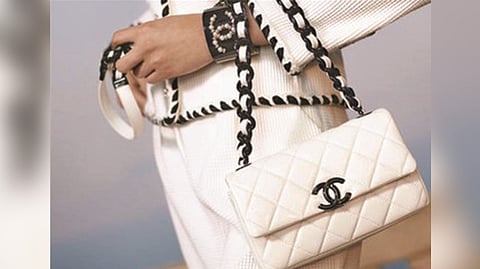

By ELLA JOYNER
NEW YORK: In a time-lapse video set to electronic music, influencer Victoria Bonya severs the flap of her handbag with a pair of oversized scissors.
“Never seen any brand acting so disrespectful towards their clients,” the Russian model wrote to her 9.2 million Instagram followers in a post.
Within seconds, an accessory worth thousands of dollars became collateral damage in a spat between the French fashion house and Russian customers.
Chanel, along with other Western firms, closed its Russian stores shortly after Moscow invaded neighboring Ukraine in February and is now complying with Western sanctions that outlaw many sales to Russians, even abroad.
Other influencers jumped on the bandwagon, and Chanel was soon facing accusations of “Russophobia,” taunts about historic connections to Nazis, and a flood of bag-destruction videos.
The company was quick to stress it was only implementing EU law. Since March, this prohibits the “sale, supply, transfer or export, directly or indirectly” of a wide range of luxury goods — which includes cigars, horses, leather goods and cosmetics worth 300 euros or more for use in Russia.
Chanel is even restricting sales to Russians abroad, confirming that it had “rolled out a process to ask clients for whom we do not know the main residency to confirm that the items they are purchasing will not be used in Russia.”
Chanel declined to explain how vetting works. “It is not a question of nationality, but of residency,” the company said in a statement.
Even less clear is what will happen with the lost market for luxury goods from companies like Chanel in light of the punitive measures. Sanctions affecting luxury goods are bad news for a sector which, like so many, has had a rough few years thanks to the pandemic.
Russian customers make up 2 to 3% of the global luxury market, according to management consultancy firm Bain & Company. In 2021, sales inside and outside Russia accounted for about $7.4 billion (or 7 billion euros).
Although the volatile situation makes forecasting difficult, the conflict will weigh heavily on the sector, senior partner and luxury goods expert Claudia D’Arpizio explained. For
Visit news.dtnext.in to explore our interactive epaper!
Download the DT Next app for more exciting features!
Click here for iOS
Click here for Android